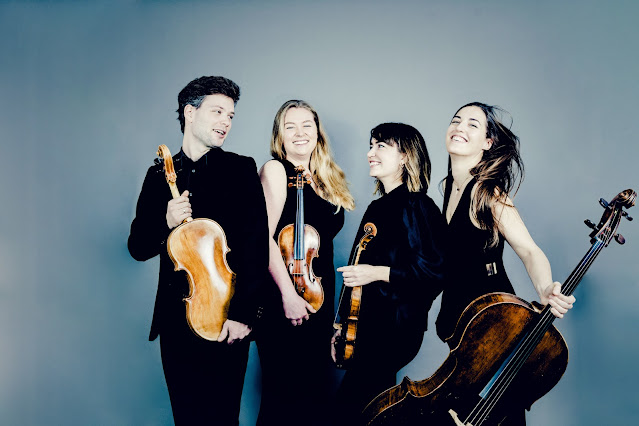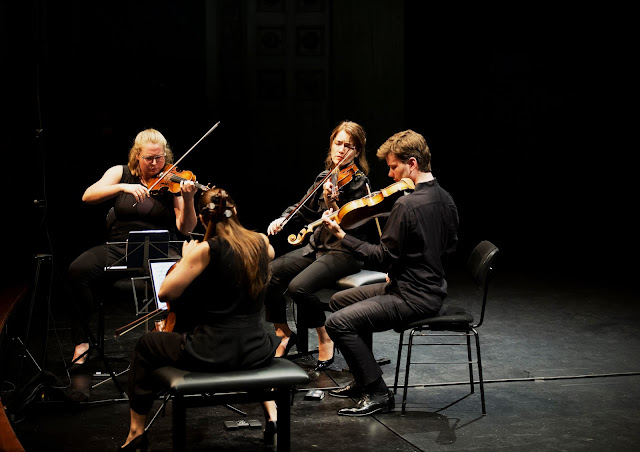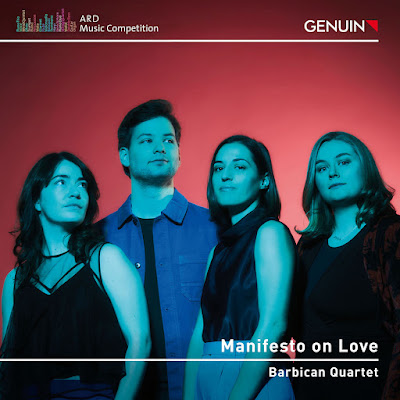 |
| Barbican Quartet (Photo: Andrej Grilc) |
The Barbican Quartet (Amarins Wierdsma, violin, Kate Maloney, violin, Christoph Slenczka, viola, Yoanna Prodanova, cello) is so-named partly because the founding members, Amarins, Christoph and Yoanna met at the Guildhall School of Music and Drama during their studies, first playing chamber music together for pleasure and later becoming more serious. The present line-up was formed in 2022 when Kate joined them, and that year the quartet won the 71st ARD International String Quartet Competition in Munich.
One of the prizes that the quartet took away from the competition was a recording with the Genuin label. That recording, the quartet’s debut, came out in June. Manifesto on Love features Leoš Janáček’s String Quartet No.2 “Listydůvěrné” (Intimate Letters), The Ear of Grain by Dobrinka Tabakova and two works by Robert Schumann, String Quartet No. 3, Op. 41 in A major and Wenn ich ein Vöglein wär. The works in the programme, including the new piece commissioned from Dobrinka Tabakova by the competition, are all linked by the idea of the love letter, as Schumann’s quartet can be seen as a love letter to his wife Clara. The idea of storytelling is something that the quartet focuses on, it gives them great pleasure. Though they felt that it made sense for their album to have a theme, Manifesto on Love also enabled them to make a wonderful connection between two pieces they love, with the nickname for Janáček’s extremely direct quartet seeming to give them their theme.
They comment that everything is connected in some way, and it is easy to make such connections even if these are somewhat abstract, there are different ways of storytelling. It is not just about having a theme, stories can involve the way pieces relate, but also the more personal element with all four individual voices creating a narrative. This sense of four different voices creating a single whole is one that the quartet works on a lot in rehearsals, admitting that it can be hard work. What they are aiming for is that sense of understanding each other without the need for words. So, the storytelling need not be literal, they can use colour and sound, as well as the sense of communication between the four voices. An abstract piece of music might have a story based on colour and mood, an essence of feeling as in a short story. Sometimes the story simply comes from a visual image as in Dobrinka Tabakova’s piece on the disc, inspired by a Joan Miró painting of the same name and links to the Brothers Grimm story.
The quartet’s repertoire is quite wide, moving from Purcell and Bach, through the classic string quartet repertoire to Berg, Britten, Ligeti and Adès. And talking about their repertoire, the players return to this idea of connectedness. If you play Purcell, then when you get a hint of Purcell in a piece by Thomas Adès you recognise it. They enjoy working with living composers and use this work to inform their playing of older works from the repertoire, adding that sometimes they realise that they don’t take a work’s score literally enough, but that sometimes they take the music too literally. Having discussed a score with living composers gives them the freedom and confidence to approach a score by one who isn’t around any more. They want to play a wide range of music, and each work informs the other.
As far as the quartet is concerned, the medium of the concert leads to the idea of time travel. The players can take the audiences in either direction, from the music of Purcell and Bach to the music of today, and anywhere in between. Taking the border of time away means that each concert can be an interesting psychological journey.
Looking ahead, they are already thinking about ideas for their next disc, adding that you can’t put the Barbican Quartet neatly in a box, so any new CD will be different from the current one, yet still true to what the quartet is.
Kate Maloney joined the quartet in February 2022, and pretty quickly had to get into harness with the quartet having the ARD Competition that Summer. They comment that sometimes they are rather jealous of pianists. The piano repertoire is very similar to that of the string quartet, but the pianist has only one brain and can come up with a concept for performing the music by themselves. With four people, they have four individuals yet must work towards making the performance sound like it was created by one brain. Four minds with but a single thought.
So, for any new player joining a quartet, there is a whole new process to learn. Kate adds that she had to get up to speed in quite a short time frame, which made 2022 a very intense year. She had around two and a half months where she had to learn how to perform all the quartet’s repertoire, new works and new ways with familiar works, then after six months, there was the ARD competition. All this meant learning the repertoire quickly. A lot of elements gelled right away, and initially, Kate fitted in with what existed already. But to form a new identity for the quartet with its new line-up, they all needed to adapt to a slightly different way of thinking, to create a common language for musical ideas and rehearsals.
They did a lot quickly, then took more time to add deeper understanding. The competition was useful, with its intense six months of work running up to it, but the real work came afterwards as they got to know each other better. They rehearse in English, though only two of them are native English speakers, which means that discussions can take time and that they communicate with a mixture of words and playing, getting to understand what each means without words.
 |
| Barbican Quartet at ARD International String Quartet Competition, 2022 (Photo: BR Klassik) |
The quartet’s mentors include the Quatuor Ébène who were very supportive during the run-up to the ARD competition. But another mentor is Günter Pichler from the Alban Berg Quartet, a player from a different country and a different generation. The players of the Barbican Quartet enjoy this sense of difference. They are also mentored by Krzysztof Chorzelski from the Belcea Quartet, meaning that have teachers from both the English and the Hungarian school, in fact, their teachers and mentors cover a wide European spectrum. They enjoy this, though they comment that it can take time to sort through input from different mentors, to make connections and that this gives them lots of tools. Faced with a particular phrase or problem they can think how would X or Y play it.
Coming up, they have their debut at the Concertgebouw in Amsterdam in August, they will also be returning to the Wigmore Hall during the 2024/25 season, having played there originally in 2017. And they have several other debuts coming up; each new concert hall is exciting, with new acoustics to learn and decisions as to how to play in it. In 2026, they will be performing at the String Quartet Biennale Amsterdam, debuting a big project exploring connections between old and new, still storytelling, based around Haydn’s Opus 20 quartets.
Never miss out on future posts by following us
The blog is free, but I’d be delighted if you were to show your appreciation by buying me a coffee.
Elsewhere on this blog
- Vivacity, humour & pathos: Opera Holland Park & Charles Court Opera in Gilbert & Sullivan’s The Yeomen of the Guard – opera review
- Prom 24: Vividness & virtuosity in an astonishing danced staging of Purcell’s The Fairy Queen – opera review
- Prom 23: riveting symphonic theatre from Benjamin Grosvenor, Edward Gardner & LPO in Busoni’s Piano Concerto – concert review
- The encounter that never was: composers Alex Ho and Sun Keting on their collaboration on a new music theatre work interweaving the stories of two very different Chinese women – interview
- More than entertainment: Oliver Webber and the Monteverdi String Band’s The Madrigal Reimagined – record review
- Confidence, style and engagement: Rossini’s The Barber of Seville at West Green House Opera is a complete delight – opera review
- An eclectic mix: Brixton Chamber Orchestra at Clapham Park Cube – review
- Prom 10: Ryan Wigglesworth, Laura van der Heijden & BBC Scottish Symphony Orchestra in Britten, Cheryl Frances Hoad & Elgar – concert review
- She played and sang: Gillian Dooley’s new book is the fruit of 15 years research on Jane Austen’s music collection – interview
- A world away from the Bibilical oratorio: Stanford’s Whitman setting is the focus for this disc of two of large-scale choral works – record review
- A vividly realised recording: rediscovering music by Latvian-American composer Gundaris Pone – record review
- Home


%20Andrej%20Grilc-.jpg?w=998&resize=998,665&ssl=1)






